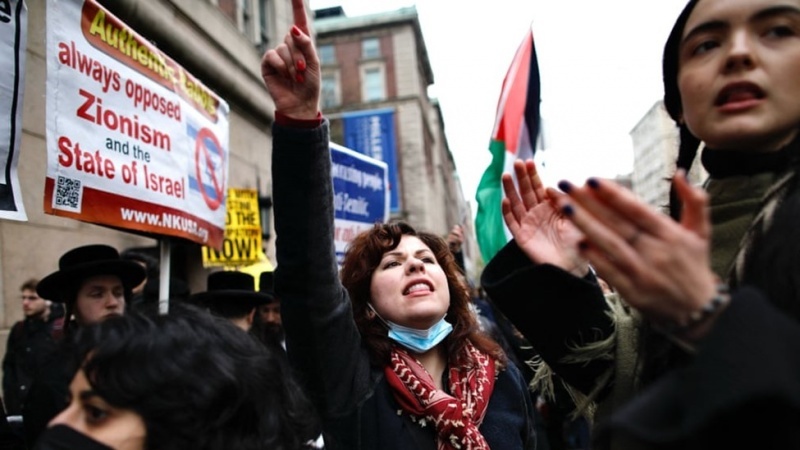The wave of protests in support of Palestine on American university campuses has expanded after the arrest of hundreds of protesters at Columbia University, and is now spreading to universities in other countries.
The protests began at Columbia University in New York 12 days ago (April 17) and protesting students are demanding that the university cut ties with Israeli institutions involved in the Gaza war; similar demands are being made by protesters at other universities.
On the other hand, the US government has taken a military approach to suppress these protests and demonstrations.
Here, we take a look at the analyses of several Iranian experts on these events:
The remarkable presence of non-immigrant Americans
Foad Izadi, a professor at the University of Tehran's Faculty of World Studies:
You don't have to be a Muslim or a leftist to participate in these protests. Humanity alone will suffice to participate in the protests after seeing these images.
Western media may distort these events, but that doesn't change the nature of the work.
Even if a percentage of this population is Muslim, we should know that they are not immigrants. Foreign students usually don't participate in protests because they might be deported from the US. Whether there are Muslim protesters or not, we should know that these individuals are American citizens. It's because of their American identity that they feel a double sense of responsibility.
The convincing challenge of liberal democracy
Saeed Abdolmaleki, a faculty member at Iran's Payam-e Noor University:
The United States invaded Iraq in 2003 to find nuclear bombs, but it was all a lie. Today, more than 35,000 humans have been killed in Gaza, most of whom were defenseless women and children. What justification does liberal democracy have for this genocide?! In reality, there is no argument that can convince the global public opinion and American academic elites on this matter. Students and professors have risen up because they feel that this system has plundered their identity, pride, and humanity, and they are practically facing a militaristic and occupying regime that the university system has been serving as a cog in the wheel of this war machine, and the students' duty has been to oil the wheels of it.
Western policy has instrumentalized democracy, human rights, and freedom of speech, and has now reached a point where it's not just people of color who are fighting against racial discrimination, but also American university professors and even some government officials and their children are speaking out.
It's not far-fetched that this university uprising will turn into a widespread social uprising, because the all-out defense and support of the US government for the Zionist regime, and the child-killing and genocide committed by this regime, have left no dignity for America's social and political capitals, i.e., American values.
The serious role of identity conflicts
Hadi Khosroshahin, an expert on American affairs:
Based on Francis Fukuyama's theory in his latest book, "Identity", there is almost conclusive evidence - especially after November 2016 - that America has entered an era of identity conflicts. There are multiple reasons for the emergence and manifestation of these identity conflicts.
Perhaps the most important reason for the emergence of these conflicts is related to some of the flaws that exist in Western liberal democracies.
On the other hand, the mainstream America fundamentally lacks the ability, possibility, or will to represent diverse voices, voices that are defined within the framework of identity conflicts. The fact that recent protests in America have intensified, persisted, and simultaneously challenged domestic politics can be analyzed within this framework.
Unlike other issues in American foreign policy, such matters are rarely reflected in domestic politics. However, the issue of genocide in Gaza has finally been able to challenge domestic politics. In this sense, one can consider this phenomenon as a part or one of the manifestations of America's entry into the era of identity conflicts. The identity conflict is actually between two main currents. One current that advocates for the preservation of white American dominance and the return to a historic and authentic America, an America that did not have ethnic diversity and multiculturalism. On the other hand, there is another current that feels its demands and expectations are not being reflected in both domestic and foreign policy.
Because the conflict is over fundamental principles and values, it naturally takes on a violent dimension. In the 2020 US elections, some polls indicated that both sides, whether supporters of Biden or Democrats, or supporters of Trump or Republicans, considered a certain level of political violence acceptable in order to pursue and achieve their electoral goals.
The possibility of protests spreading to ordinary people
"Hadi Borhani", Professor of Palestine Studies at Tehran University:
In Western countries and the US, universities hold a special position, and on the other hand, these protests are taking place in the best universities in the US. If they continue, the waves of transformation and change can spread to "ordinary people" as well.
If the protests spread to ordinary people, the US government will no longer be able to stop them, and this will ultimately become a threat to the Zionist regime and its lobby in the US.
In the US, there is a "pseudo-democracy" and if the majority of the people in this country oppose supporting the Zionist regime, the policy of supporting this regime will no longer be sustainable, and Washington's support for Tel Aviv will be endangered.
Sources:
- Mehr news agency (2024): "Student protests in US can spread to ordinary people."
- Fatemeh Barimani (2024): "Sociology of the October 7th student movement." Farhikhtegan Newspaper
- Tasnim news agency (2024): "The university uprising in US turns into a widespread social uprising."
/129

